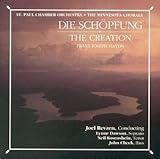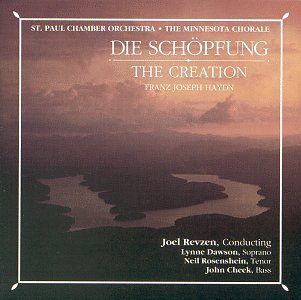Disco de Franz Joseph Haydn: «Haydn: Die Schöpfung (The Creation)»

- Valoración de usuarios: (4.5 de 5)
- Título:Haydn: Die Schöpfung (The Creation)
- Fecha de publicación:1995-07-06
- Tipo:Audio CD
- Sello discográfico:Albany Records
- UPC:034061000525
- 1 - 1The Creation: No.1 Introduction
- 1 - 2The Creation: No. 2 Recit. - Chorus (Raphael)
- 1 - 3The Creation: No. 3 Aria - Chorus (Uriel)
- 1 - 4The Creation: No. 4 Recitative (Raphael)
- 1 - 5The Creation: No. 5 Solo - Chorus (Gabriel)
- 1 - 6The Creation: No. 6 Recitative (Raphael)
- 1 - 7The Creation: No. 7 Aria
- 1 - 8The Creation: No. 8 Recitative (Gabriel)
- 1 - 9The Creation: No. 9 Aria
- 1 - 10The Creation: No. 10 Recitative (Uriel)
- 1 - 11The Creation: No. 11 Chorus
- 1 - 12The Creation: No. 12 Recitative (Uriel)
- 1 - 13The Creation: No. 13 Recitative
- 1 - 14The Creation: No. 14 Trio - Chorus
- 1 - 15Part II: No. 15 Recitative (Gabriel)
- 1 - 16Part II: No. 16 Aria
- 1 - 17Part II: No. 17 Recitative (Raphael)
- 1 - 18Part II: No. 18 Recitative (Raphael)
- 1 - 19Part II: No. 19 Trio - Chorus
- 2 - 1Part II: No. 20 Recitative (Raphael)
- 2 - 2Part II: No. 21 Recitative
- 2 - 3Part II: No. 22 Aria
- 2 - 4Part II: No. 23 Recitative (Uriel)
- 2 - 5Part II: No. 24 Aria
- 2 - 6Part II: No. 25 Recitative (Raphael)
- 2 - 7Part II: No. 26 Chorus - Trio
- 2 - 8The Creation: No. 27 Recitative (Uriel)
- 2 - 9The Creation: No. 28 Duet - Chorus (Adam - Eve)
- 2 - 10The Creation: No. 29 Recitative (Adam)
- 2 - 11The Creation: No. 30 Duet (Adam - Eve)
- 2 - 12The Creation: No. 31 Recitative (Uriel)
- 2 - 13The Creation: No. 32 Chorus
I confess that I am partial to this recording partly (only partly) because I was in the chorus that recorded it.
But it remains the best recording of the piece I know of, and I'm not alone in that opinion; Alan Rich/New Yorker agreed in his review.
I am so glad we sang it in German, which fits the notes and phrases that Haydn wrote ("singing translations" are usually awful). We worked very hard to preserve a lightness of texture and the sprightly rhythms appropriate to Baroque music. It MUST dance, and this does. We had first-rate soloists. And the recording engineers worked very hard (as we did) to make the most of dynamic contrasts. And they work magnificently. The "und es ward LICHT" moment is one of the most exciting surprises I ever heard in a concert hall (precisely what Haydn intended it to be).
You can't go wrong with this one.
The "Creation" libretto, originally in English (sung in German, here), is based on Genesis, the Psalms, and on Milton's "Paradise Lost." Archangels, a chorus, and Adam and Eve make up the singing parts, and were usually accompanied in the eighteenth and nineteenth centuries by a large orchestra. In this 1988 recording, the singers are accompanied by the slightly smaller Saint Paul Chamber Orchestra, which plays with correctness and polish.
My only criticism is that the dynamics of the introduction, "Die Vorstellung des Chaos," vary so greatly that I have to fiddle with the volume knob during the whole interval when darkness is still "upon the face of the Deep." (A little over 7 minutes in this version.)
Lynne Dawson is the British soprano who sang the "Libera Me" from Verdi's "Requiem" at the funeral of Princess Diana. In this 1988 recording with, she takes on the dual roles of Eve and the archangel Gabriel. She sounds exactly how I would expect an angel to sound: glorious and yet ravishingly pure.
Dawson's latest release, issued by Hyperion, is a solo CD of English songs called "On This Island," and she has also recorded many a Mozartian soubrette.
John Cheek, the American base who made his Metropolitan Opera debut in 1977, employs his resonant bass in the roles of Adam and the Archangel Raphael (he would have been a great voice of God, if Haydn had given God a singing part).
American lyric tenor Neil Rosenshein sings the role of the Archangel Uriel.
Incidentally, no sad ending mars Haydn's most famous oratorio. While listening to "The Creation," you can almost believe that we never did get kicked out of Eden.

